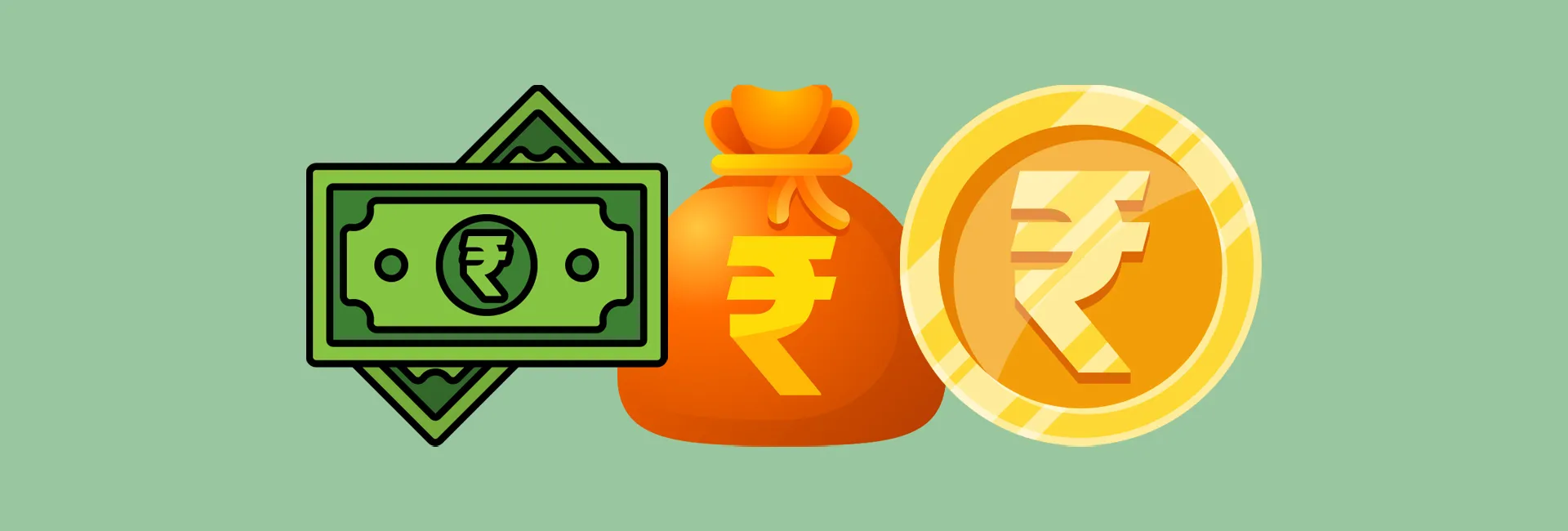Online casinos that accept Indian rupees offer a convenient choice for players who prefer gambling in their national currency. Using INR (Indian rupee) eliminates unnecessary conversion fees and commissions, making deposits and withdrawals more transparent and comfortable.
On this page, we’ll explain how online casinos that accept Indian rupees operate, explore the history of the currency, discuss its role in the gaming industry, and review the most popular payment systems available to Indian players.
For more about the world of gambling in India, visit our website by following this link.
History of the Currency

The Indian rupee (₹, INR) is India’s official currency, with origins tracing back to ancient times. The word “rupee” derives from the Sanskrit rūpya, meaning “wrought silver” or “silver coin.”
The first standardized rupees were introduced in the 16th century under Sher Shah Suri, a ruler of North India. He issued silver coins weighing 178 grains (~11.5 grams), which became the prototype for the modern rupee. These coins maintained consistent weight and shape, earning trust among merchants and the public.
During British rule, the rupee remained India’s currency but was adapted to colonial economic needs. After India’s independence in 1947, the currency decimalized in 1957, dividing 1 rupee into 100 paise.
Today, the rupee is not only a symbol of India’s economy but also one of Asia’s most actively traded currencies. Regulated by the Reserve Bank of India, its use in online casinos is growing due to its convenience and stability.
Key Dates
- 16th century (~1540): Sher Shah Suri introduces the first silver rupee (178 grains), marking the birth of the modern Indian rupee.
- 1835: The British administration establishes a unified rupee across India as the official currency of British India.
- 1947: India gains independence, retaining the rupee as its national currency.
- 1957: Decimalization—1 rupee = 100 paise (replacing annas, paise, and pie).
- 1991: Economic liberalization integrates the rupee into global trade.
- 2010: The rupee’s official symbol (₹), designed by Udaya Kumar, is adopted.
- 2020s: Surge in rupee usage for online transactions, including casino deposits and withdrawals.
Features of Playing in Indian Rupees

Gambling in INR offers distinct advantages, particularly avoiding currency conversion. Players see exact bet amounts, wins, and bonuses in rupees, saving on fees.
However, not all international casinos support INR, sometimes auto-converting to dollars/euros, which may incur hidden charges or unstable exchange rates. Some payment systems (e.g., PayPal) restrict rupee transactions or require intermediate conversion.
Additionally, Indian banks may block gambling-related transactions, especially for unlicensed casinos. Players often resort to alternatives like cryptocurrencies, e-wallets, or vouchers.
Some internationally oriented casinos may impose INR betting limits due to fluctuating exchange rates. Meanwhile, land-based casinos in India are legal only in Goa and Sikkim, where rupees are accepted under strict state regulations.
Overall, playing in rupees is convenient and cost-effective when choosing reputable INR-friendly casinos with flexible payment options.
Popular Payment Methods

Players favoring rupee-based casinos prioritize fast, secure, and convenient payment systems. The most popular options in India include:

UPI (Unified Payments Interface)
UPI is one of the most convenient and fastest ways to transfer funds directly from a bank account. It’s especially popular due to its minimal fees, instant transactions, and seamless integration with mobile apps like PhonePe, Google Pay, and Paytm.

E-Wallets
This category includes systems like Skrill, Neteller, Jeton, and AstroPay. They allow transactions in rupees and are often used when banks block direct transfers to casinos. These services are also valued for their anonymity and speed of execution.

Cryptocurrencies
While cryptocurrencies don’t directly support INR, many players use BTC, USDT, and other tokens to bypass banking restrictions. After making a deposit, the funds are automatically converted into the required currency, and casinos often offer extra bonuses for crypto deposits.

Bank transfers and cards
Traditional methods like Visa and Mastercard are still relevant, but Indian banks may block transactions related to gambling. As a result, players use them less frequently or opt for international payment cards.

Prepaid Cards and Vouchers
AstroPay and other prepaid solutions are particularly convenient for those who prefer not to share their banking information. They can be purchased online and used to top up balances without extra verification.
It’s important to note that the availability of payment methods depends on the specific online casino. Before registering, make sure the platform supports the payment options that are convenient for handling rupees.
Casinos for Playing in Indian Rupees FAQ
Yes, many online casinos accept INR, allowing Indian players to gamble without currency conversion or extra fees. This makes deposits and withdrawals simpler and more transparent.
The most popular options include UPI, Google Pay, PhonePe, e-wallets (e.g., Skrill, Neteller), cryptocurrencies, and prepaid vouchers like AstroPay. Some casinos also accept bank cards, though Indian banks may impose restrictions.
Some platforms may enforce minimum or maximum bet limits, especially those targeting international markets. Additionally, Indian banks may block gambling-related transactions, prompting players to use alternative payment methods.
Yes, provided you choose licensed casinos that support INR and trusted payment systems. Using rupees helps avoid hidden currency conversion fees.
The key advantage is convenience—no need to convert bet amounts or winnings, nor pay exchange fees. This is especially important for active players who rely on precise balance control and quick transactions.


